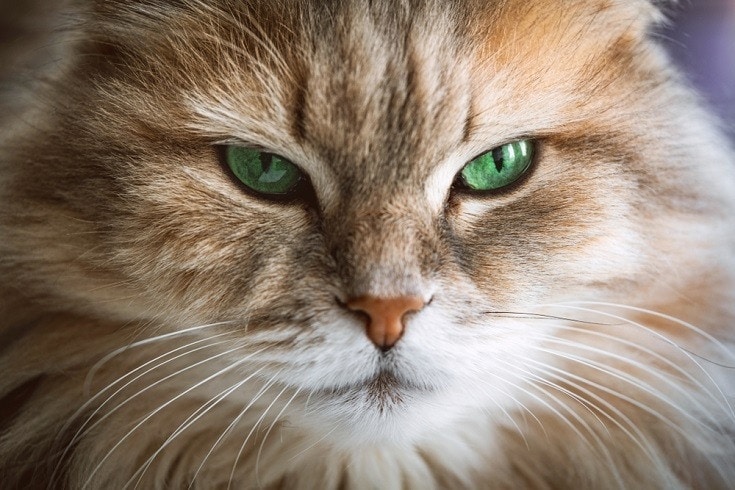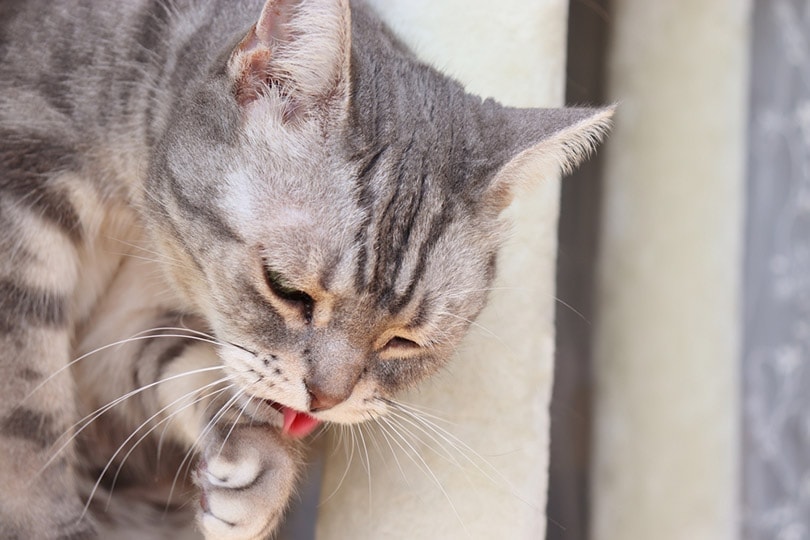Why Does My Cat Lick My Face? 6 Possible Vet-Reviewed Reasons

Updated on
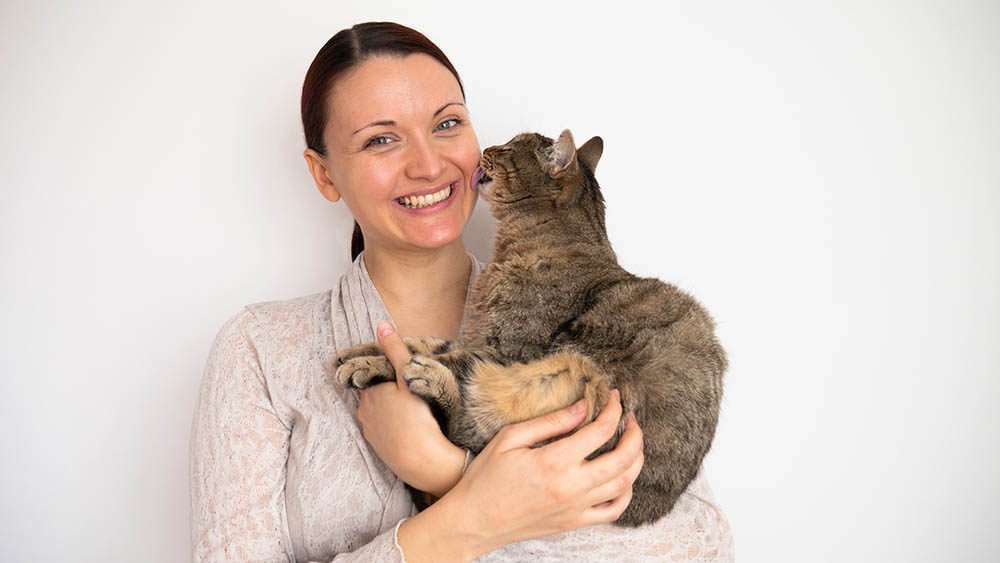
Signs of affection from your cat can be wonderful, but a cat who insists on constantly licking you can become anything but pleasant. If your cat likes to lick your face, for some people, it can be irritating, uncomfortable, and unhygienic. Despite common belief, some of the reasons for cats licking their owners excessively may also not be a sign of positive emotions but stress, illness, social hierarchy, and anxiety. Speak to your vet if your cat has suddenly started licking you or themselves excessively.
If you’re wondering why your cat loves to lick your face or beard, here are some possible reasons for this behavior and how you can correct it.
The 6 Reasons Your Cat Licks Your Face
1. Bonding Behavior and Social Hierarchy
Cats groom their kittens by licking them in order to clean them, help them toilet, and also to leave a scent on them and make it familiar for both her and the kittens. Kittens start grooming and licking each other and their mother as they grow, and this is a behavior observed within a colony of cats who live together and have formed a social bond. However, the purpose and instinct behind allogrooming may have a more complex background.
Research has shown that allogrooming is not entirely a sign of nurturing and affection through familiar bonding behaviors. It is also done by cats in the same household as a way to exert dominance and avoid a conflict, with the groomer being the dominant one. Exactly why some cats want to lick their owner’s faces remains a little bit unclear and likely is a combination of many reasons, but it may also indicate social bonding with you.
Excessive licking alongside other stereotypical behavior, such as wool sucking, may be present in kittens that were weaned early. If your cat has suddenly started licking you excessively or they have never done it before, it’s crucial to speak to your vet, as there may be other reasons for this behavior, and we will discuss them shortly.
2. Possessiveness
Licking is a way for your cat to mark certain objects in order to identify them as safe and claim them as their possession, giving it a familiar scent. Cats will often do this with toys, furniture, parts of the house, and sometimes other pets and family members.
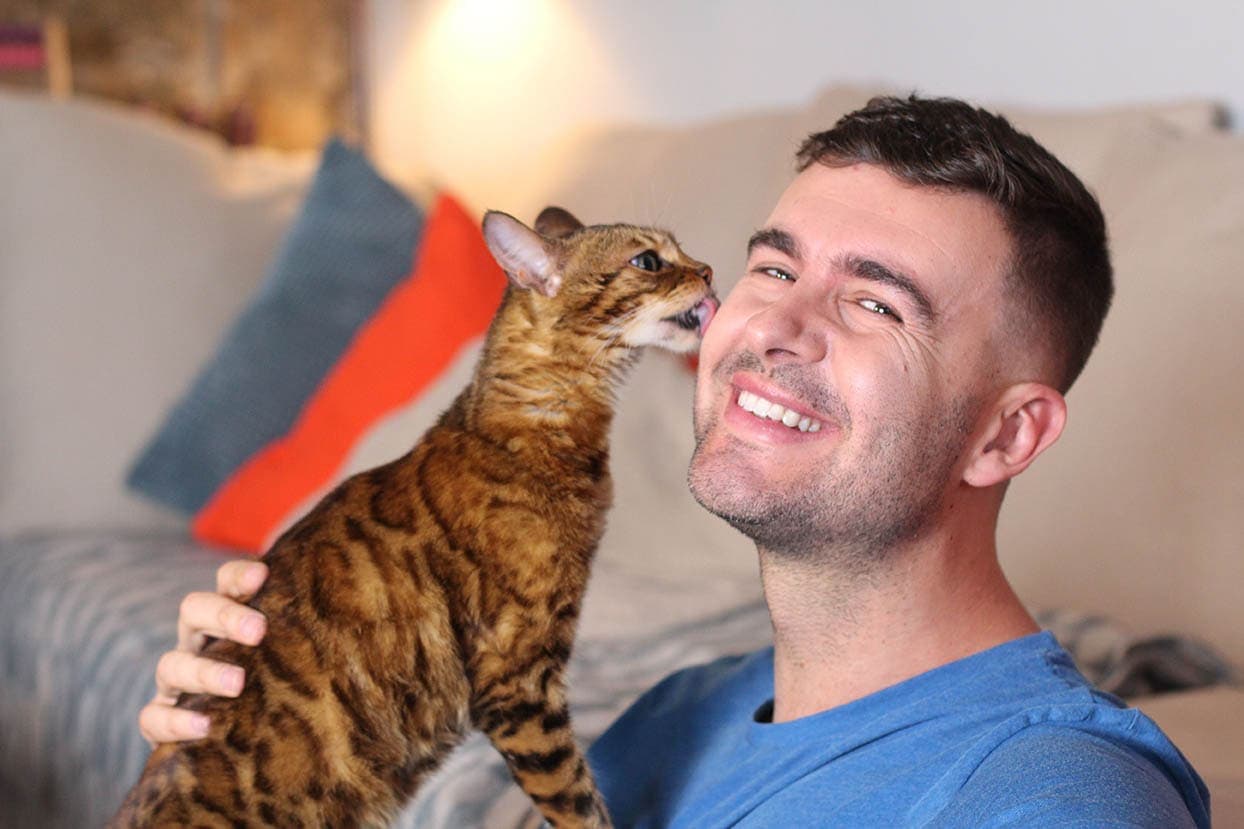
3. Seeking Attention
Cats may have a reputation for being very independent, but they can be demanding when they want attention or food. Licking is a good way to get your attention since you likely interact with them to get the behavior to stop or stop what you’re doing to pet your cat. You’ve reinforced this behavior, so your cat continues to do it to get what they want. Remember that negative attention is still attention, so move away from the cat to stop the behavior, and only reward them with attention and cuddles when they’re not doing it if you dislike this behavior.
4. Taste
Cats are curious animals, so licking may simply be because you smell or taste good. If you have food in your beard or have applied a strong-smelling face lotion or cream, your cat may be attracted to the scent and licking to investigate. Your sweat also has salts that your cat may enjoy. Discourage your cat from licking your skin if you have applied anything on it or if you have any skin sores, as the cat’s mouth contains bacteria and this may lead to an infection.
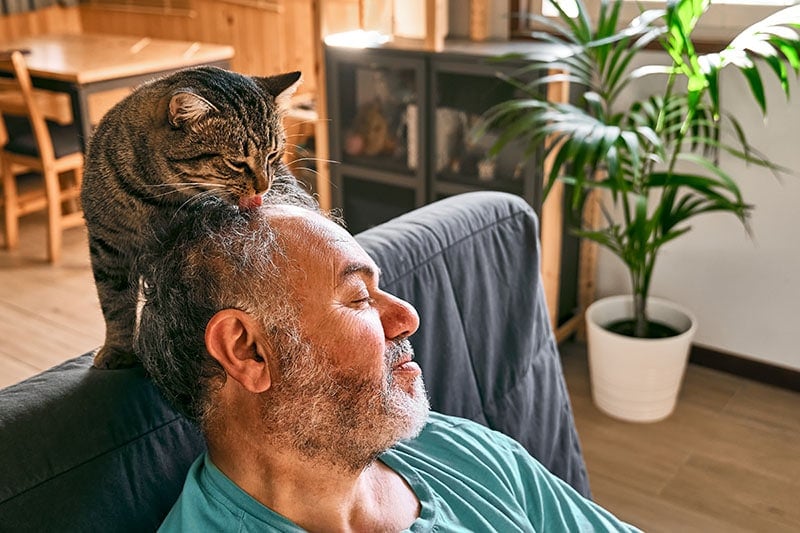
5. Anxiety
Licking can be a displacement behavior, which is an action your cat uses to relieve stress. This is usually seen with self-grooming behaviors, but it can be extended to you. If you notice the licking only happens during stressful situations, like when you have visitors, or there’s a storm or fireworks, it’s likely because of anxiety. If this continues without recognition and treatment, it can lead to compulsive behavior that results in skin irritation and other health issues.
6. Medical Problems
If your cat is suffering from medical problems like pain, digestive upset, or nausea, they may lick you, themselves, and other pets or objects more than they usually would. If your cat’s licking is a new behavior or reaches an excessive or compulsive level, it’s time for a vet visit to rule out medical conditions.
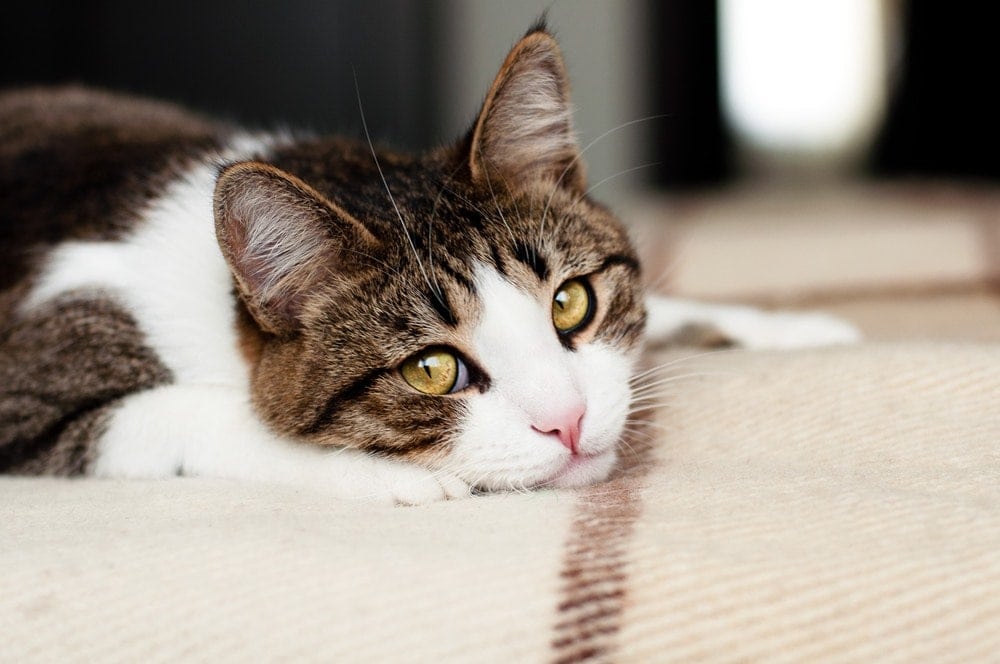
Is It Safe for Your Cat to Lick You?
While it’s generally safe for cats to lick you, cats do carry and spread some zoonotic diseases or diseases that can be transmitted to people. Most healthy adults have a strong enough immune system to fight off diseases from cats, but infants, immunocompromised people, and the elderly are more susceptible to zoonotic diseases from cats.
Cat scratch disease is a bacterial infection carried in the saliva of infected cats and cat fleas and may be transmitted to humans if a cat licks an open wound or broken skin or scratches a person. People infected with cat scratch disease may develop swelling and blisters, fever, headache, swollen lymph nodes, body rash, and fatigue. It’s treatable, but it may take weeks or months to heal, and complications may arise in immunocompromised people.
Cats can also carry diseases that are passed to humans through indirect or direct contact with feces such as toxoplasmosis, nasal discharge, or through cat bites in case of Pasteurella multocida. Fortunately, the risk of your cat passing these pathogens to you is low, especially through licking behaviors, but it’s important to be informed.
If you or someone in your household is immunocompromised, elderly, or young, it’s best to curb licking behaviors in your cat. You should also keep up with hygiene, such as washing your hands after handling your cat and using gloves to clean the litter box. It’s also important to keep up with your cat’s veterinary care and keep it indoors to reduce disease risk.
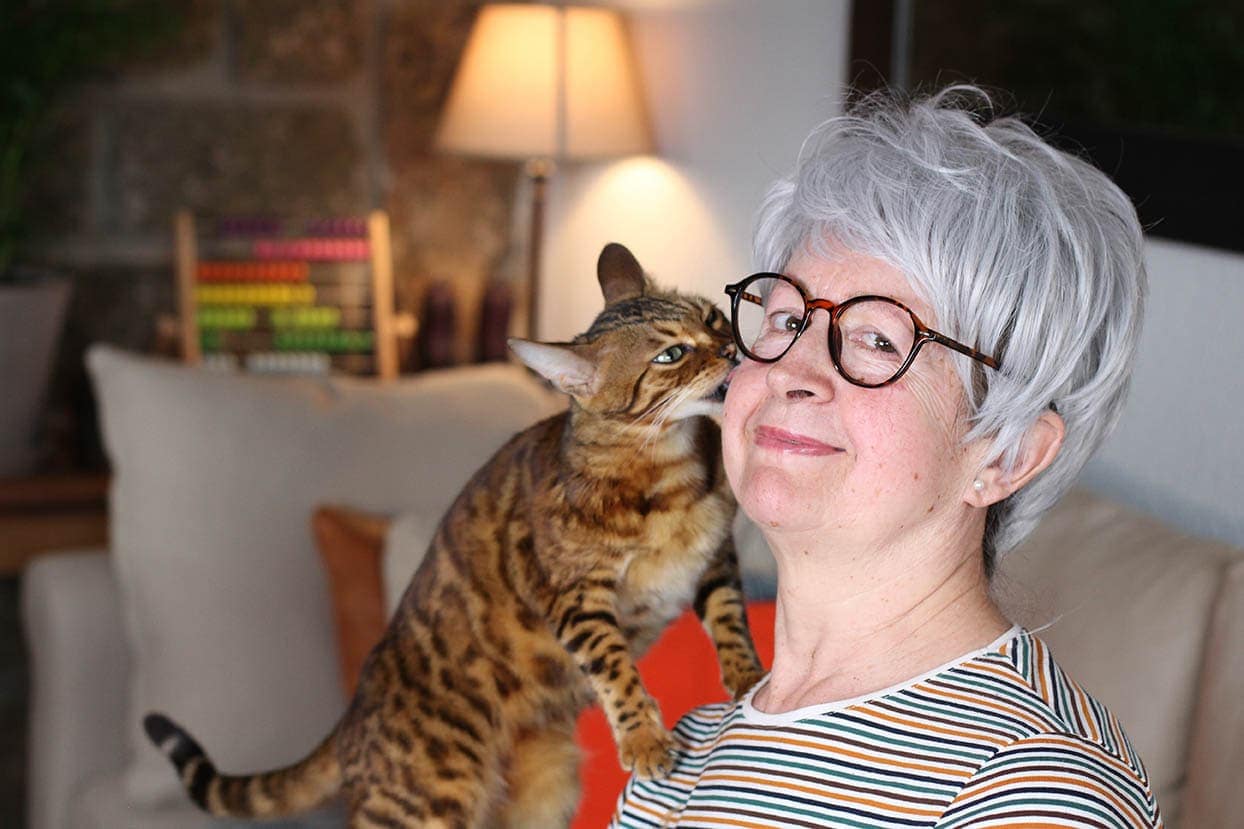
How to Stop Your Cat from Licking
The reason for your cat’s licking behavior can give you some guidance in how to reduce or stop it. If there’s a medical issue or emotional concern like anxiety, correcting the problem can eliminate the licking.
- Redirect licking behavior by giving your cat a toy, puzzle, or game feeder at times when you may predict their licking behavior to begin.
- When your cat licks you, move away. Be careful not to accidentally reinforce the behavior by talking to or petting your cat until the behavior stops.
- Offer praise and rewards when your cat gives you affection without licking.
- Play with your cat often and provide enrichment like interactive toys, trees, and even walks outside on a harness and lead all to avoid boredom, frustration, fear, or anxiety.
- Never scold your cat or use any punishments like loud noises or water spray bottles to deter your cat. This is likely to increase anxious licking.
 Conclusion
Conclusion
Cats lick their owners for several reasons, but excessive licking can be annoying and disruptive. The key to reducing or eliminating excessive licking lies in determining the underlying cause and addressing it, then applying behavioral training to discourage licking and teach your cat appropriate bonding behaviors.
Featured Image Credit: NivCube, Shutterstock


